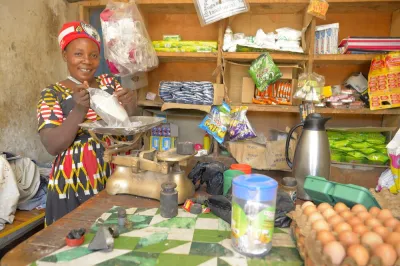Women’s Empowerment Indicators

In recent months, the Working Group on Measurement and Data within CGAP’s Finequity Community of Practice (COP)has sought to shed light on the existing data landscape for sex-disaggregated data in financial inclusion. Through a sponsored webinar series featuring panelists from the Bill & Melinda Gates Foundation, World Bank’s Global Findex, and FinMark Trust’s FinScope and Insight2Impact platform, we have explored the availability, limitations, and challenges of publicly accessible financial inclusion datasets using a gender lens.
In the third webinar of the series, held 5 December 2017, we took a closer look at a unique dataset, Financial Inclusion Insights (FII), produced by InterMedia. Unlike other data sources, FII data has a dedicated gender module measuring women’s economic empowerment. The module aims to assess whether women are achieving economic success and have agency over financial decision-making as a result of access to finance.
Freely available via FII’s Data Fiinder, FII data covers four years of nationally representative survey results, and country reports summarizing key findings about the financial behaviors of adults aged 15 and older in Indonesia, India, Nigeria, Kenya, Tanzania, Uganda, Bangladesh and Pakistan. FII includes data and analysis regarding people’s financial lives, attitudes, awareness of, access to, use of, and advanced engagement with financial products and services. This information includes their ability to enter the labor market, earn an income, acquire assets, hold savings, and experience increased autonomy over household bargaining.
 During the webinar, Nadia van de Walle, Senior Research Manager at InterMedia, discussed the importance of sex-disaggregated data in their recently released 2016 dataset. She explained how FII data can be analyzed to see how financial inclusion enables women’s empowerment. For example, we can see if having a bank account helped women gain access to capital, or allowed them to purchase labor-saving devices to free up time for other activities, such as productive income-generating work which can provide an initial step toward economic success.
During the webinar, Nadia van de Walle, Senior Research Manager at InterMedia, discussed the importance of sex-disaggregated data in their recently released 2016 dataset. She explained how FII data can be analyzed to see how financial inclusion enables women’s empowerment. For example, we can see if having a bank account helped women gain access to capital, or allowed them to purchase labor-saving devices to free up time for other activities, such as productive income-generating work which can provide an initial step toward economic success.
The FII gender modules have evolved over time. In their first iteration in 2014, the data included sex-disaggregated indicators on financial behaviors. Soon after, additional gender modules and indicators were included. In 2017, with the support of the Bill & Melinda Gates Foundation and the International Center for Research on Women (ICRW), new survey questions were included to help ensure women were answering honestly and without hesitation, as well as to assess women’s influence and intra-household borrowing and bargaining. The FII gender modules evolved to go beyond women’s autonomy in decision-making, to better understand women’s role and the weight of their involvement in decision-making.
The FII gender module has 16 women’s empowerment indicators that look at agency, empowerment, asset accumulation, and economic security. These indicators are currently being analyzed and tested by InterMedia and will focus on areas related to intra-household bargaining, influence, and decision-making. Some sample questions from the gender survey module include:
- How involved are you in deciding what kind of financial services you use?
- If your parents or in-laws were to speak their mind on a decision regarding how to spend your household’s income, about how much influence do you think your parents or in-laws would have on the final decision?
- To what extent do you typically agree or disagree with the final decisions about how your household’s income is usually spent?
Analysis is ongoing, but initial findings from Kenya in 2017 show that the gender gap between men and women with bank accounts has grown over the last five years, as has the gender gap for men and women who are active users of digital financial services. Interestingly, the gender gap between rural men and women, and among low-income populations, is smaller than previous years.
 The results get especially interesting when we start to look for correlations between financial inclusion and women’s levels of intra-household bargaining power and influence over household financial decision-making. The FII data found that for the question “How involved are you in deciding what kind of financial services you use?,” Overall, Kenyan men are 24% more likely to say they are highly involved than women. However, when instruments of financial inclusion are introduced, such as access to bank accounts for men and women – the gender gap becomes insignificant. This suggests that financial inclusion eliminates the effect of gender on the ability to choose which financial services to use.
The results get especially interesting when we start to look for correlations between financial inclusion and women’s levels of intra-household bargaining power and influence over household financial decision-making. The FII data found that for the question “How involved are you in deciding what kind of financial services you use?,” Overall, Kenyan men are 24% more likely to say they are highly involved than women. However, when instruments of financial inclusion are introduced, such as access to bank accounts for men and women – the gender gap becomes insignificant. This suggests that financial inclusion eliminates the effect of gender on the ability to choose which financial services to use.
Further, when women were financially included, there was no significant effect of gender on the empowerment variables related to the influence of other family members. Financial inclusion increased the odds of women’s empowerment across all of the empowerment indicators. Therefore, in Kenya, financial inclusion appears to be a much stronger determinant of autonomous decision-making than gender.
As we can see, sex-disaggregated data can provide critical information not only on access to financial services, but also on the benefits and outcomes that can be derived from financial inclusion.
The FII gender module and women’s empowerment indicators are an important step in looking beyond access and use of financial services and products, and focusing on the influence and bargaining role of women within households. InterMedia plans to refine the gender module further and roll it out in more countries, while also exploring the impact of financial inclusion instruments on the labor market and connecting financial inclusion to poverty, resilience, and economic shocks.
We encourage you to explore the latest FII data via FII Data Fiinder, an interactive data visualization tool found on the FII website and subscribe to the COP mailing list for information about future interactive learning opportunities.
On January 31 at 9:30 AM EST, the Data & Measurement Working Group of the Women’s Financial Inclusion COP, will host our next webinar in the data series that will look at gender insights from nationally representative FinScope surveys, register here.


